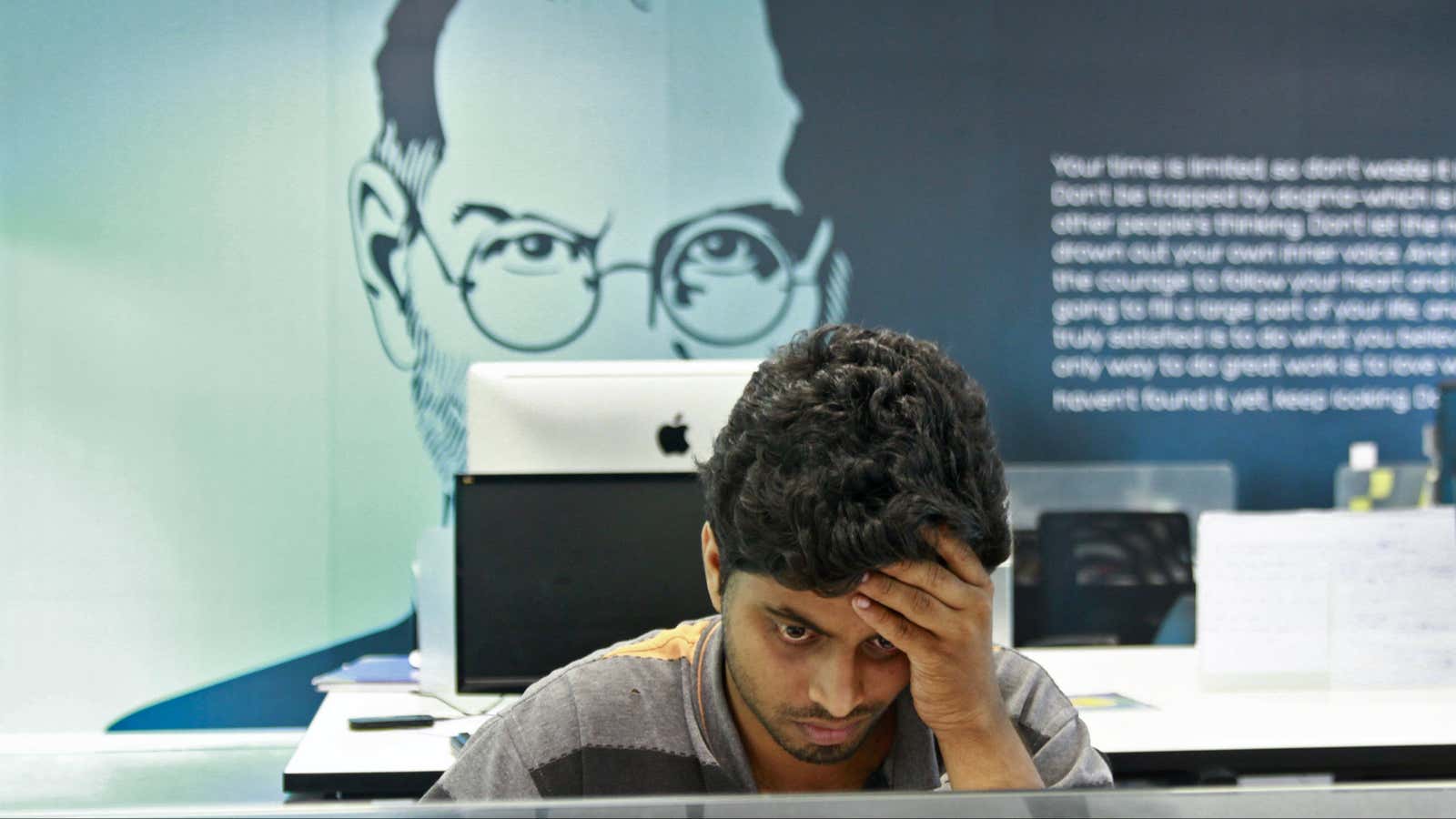At a time when women-friendly workplace policies are picking up steam in India, a sexual harassment scandal at a top entertainment startup is showing that there’s still a long way to go for real gender equality at the office.
On March 12, a former employee of digital media giant The Viral Fever (TVF) accused its co-founder, Arunabh Kumar, of persistent ”abuse and molestation” in a post on Medium. While the anonymous account of nearly two years of inappropriate behaviour was rubbished by TVF in its own statement on Medium, two other women have since taken to Facebook to recount similar experiences with Kumar.
“We will leave no stone unturned to find the author of the article and bring them to severe justice for making such false allegations,” TVF wrote in its response, without mentioning any plans for investigating the accusations.
And that points to the difficulty of working as a woman in a male-dominated industry that sometimes lacks even the most basic policies to handle issues of sexual harassment or worse.
The boy’s club
As in Silicon Valley, women are a rare breed in India’s startup ecosystem, too. Less than 9% of its founders are women, according to a 2016 study by startup database Xeler8. And out of the 670 Indian startups that received funding in 2016, just 3% were founded by women alone.
The result is that the patriarchy and misogyny of India’s society can be magnified at a startup workplace, with women having to contend with colleagues who rarely view them as equals.
“Given that we are a very gender-insensitive patriarchal society, startups are no different,” Sairee Chahal, founder of the women-only job portal Sheroes, said in an email. “Many young men perpetuate the attitudes from outside the workplace into the workplace.”
That can mean anything from sexual harassment and inappropriate language to even just microaggressions that reinforce the idea that women are out of place in the office.
A 26-year-old former employee of a data analytics startup in Bengaluru, who asked to remain anonymous, recalls that there were just 20 women at her workplace, compared to 60-70 men. Moreover, none of the managers were women, making for an environment that wasn’t always friendly to female employees.
“(Women) were treated different, in that they were left out of certain meetings and not allowed to try their hand at new types of projects,” she explained. “And at times, (they were) made to feel like they should feel lucky for just being included in such a male-dominated company.”
She remembered that the two women on her team of eight people were never invited to participate in client calls, despite working on their projects for weeks. Her male colleagues, though, were automatically included. And though the women were eventually invited to join in, at her request—the men never had to ask, of course—they were always made to feel grateful for the opportunity.
But this particular startup at least possessed a strict sexual harassment policy that was communicated to all employees and enforced. That isn’t always the case across India’s startup industry.
Growing pains
Under the fairly comprehensive Sexual Harassment of Women at the Workplace (Prevention, Prohibition and Redressal) Act of 2013, Indian companies with 10 or more employees are required to have an internal complaints committee to handle issues of sexual harassment at the workplace, ideally led by a woman employed at a senior level. Moreover, they’re also supposed to regularly organise workshops and awareness programs to sensitise employees to the signs of sexual harassment and the legal consequences, and conduct fair investigations of any claims.
And while this has become the norm in most companies, the reality at startups is a little different. Because they begin with just a handful of employees and a developing organisational structure, sexual harassment policies are sometimes the last priority.
“…The startup culture is so fast in the way it works, I’m not sure if, not only this, but even other policies, have had the time to be implemented,” Shachi Irde, executive director of the non-profit Catalyst India, said.
A 25-year-old employee of a six-year-old startup in Bengaluru, who spoke on the condition of anonymity, confirmed this. She noted that her company still lacks a formal sexual harassment policy or complaints committee, even as it now employs around 200 people.
“(For) the first few years, the founders are the ones who are hiring. Then, after a certain point, the HR comes along. But they are focussed solely on talent acquisition—which is getting more people in through the door,” she explained. “It’s only in the last six months, after we’ve filled in all the key roles, that we got our EPF accounts made and have a formal appraisal cycle set up. So, having a sexual harassment policy is so far out in the order of things.”
Cases like this make it difficult for women in the startup industry who do encounter sexual harassment or difficulties at the workplace to seek out help. And the situation becomes even more complicated when the person responsible is also the one running the show. For instance, the former TVF employee alleges that her complaints weren’t taken seriously by anyone, with the company’s legal team initially even preventing her from quitting, citing breach of contract.
“…Even if you believe the accusation was false, the least you do is investigate,” Tanmay Bhat, a comedian and co-founder of the comedy collective All India Bakchod, told Quartz. “Dismissals like those make it harder for more women to speak out against harassment at the workplace.”
And that is what perpetuates a culture that leaves women feeling like outsiders. What’s needed, then, is for companies to take a stand to create a more inclusive work space, particularly when it comes to new-age, developing enterprises like India’s startups.
“…You need powerful voices from the organisation to come forward and advocate for justice to anyone who is being harassed,” Bhat said.
Madhura Karnik contributed reporting for this piece.
